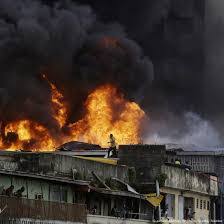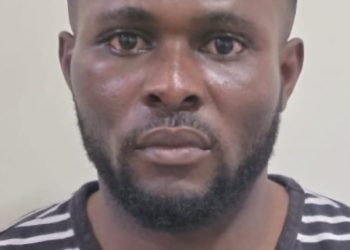*HURIWA cries fowl over inferno, says it targeted economic displacement
A section of the popular Alaba International Market in Lagos was engulfed by a raging fire that destroyed several shops and properties worth millions of naira.
The Alaba International Market, situated along the Lagos-Badagry Expressway, is regarded as one of the largest commercial hubs in West Africa, bustling with traders dealing in electronics, furniture, and building materials.
In a statement titled, “Lagos Fire Contains Incident at Alaba International Market,” the Senior Public Affairs Officer of the Lagos State Fire and Rescue Service, Maria Fadairo, said the fire started in a residence opposite a popular eatery in Alaba International Market, Ojo Local Government Area, at about 7:18pm.
The statement reads: “The Lagos State Fire and Rescue Service received a distress call at 19:18hours today reporting a fire outbreak at 155 Olojo Drive, opposite Tantalizers, Alaba International Market, Ojo Local Government Area, Lagos State.
“Upon receiving the alert, the Ojo and Ijegun-Egba Fire Stations were immediately deployed to the scene.”
She explained that the inferno affected “multiple lock-up shops of varying sizes situated within a two-storey building occupying approximately 648 square meters, within a larger market premises spanning about five hectares.”
Preliminary investigations, she added, revealed that the fire originated from the topmost floor of the building shortly after power was restored.
“Access to the affected areas proved challenging as most shops were closed for the day, necessitating forced entry to gain access and suppress the fire—a delay that contributed to the spread of the flames which was, however, confined to the floor.”
While noting that the affected shops mainly dealt in furniture items, alternative power equipment, and had a law office, the fire service image maker stressed that “no casualties or injuries were recorded.”
The General Manager of the Lagos State Fire and Rescue Service, Margaret Adeseye, has commended the swift response of all emergency agencies.
Adeseye also urged traders and residents to maintain strict fire safety measures, particularly in crowded commercial areas.
Meanwhile, The Human Rights Writers Association of Nigeria (HURIWA), has expressed concern over the recurring pattern of fires and demolition exercises affecting major markets and commercial areas dominated by Igbo traders in Lagos State, warning that the trend poses a grave threat to national unity and economic stability.
This follows Tuesday’s fire outbreak at the Alaba International Market, Ojo, which razed several shops and warehouses, destroying goods worth several billions of naira.
The Lagos State Fire and Rescue Service confirmed its personnel were on the scene to contain the inferno, but videos shared on social media showed traders in anguish as flames engulfed sections of the market.
HURIWA, in a statement issued in Abuja on Wednesday, described the Alaba fire as “a tragic addition to the growing list of incidents undermining the economic base of a specific segment of Nigerians in Lagos,” and called for an independent investigation to determine the cause of the fire and assess the response time of relevant emergency agencies.
The association noted that the incident comes barely weeks after the Lagos State Government carried out large-scale demolitions at the Lagos International Trade Fair Complex in Ojo, despite widespread public condemnation and appeals for dialogue with affected traders.
Similar demolitions have also been reported in Alaba Rago, Abule Ado, and parts of Ikota and Lekki, where several businesses owned by Nigerians of southeastern origin were destroyed.
According to HURIWA, in the statement by Comrade Emmanuel Onwubiko, it’s National Coordinator, these repeated incidents have created a perception of selective enforcement and economic targeting, particularly against Igbo traders, and have deepened ethnic mistrust in the state.
The association warned that such actions, whether deliberate or coincidental, have the potential to inflame ethnic tension and should be addressed with urgency and transparency.
“HURIWA has consistently maintained that Lagos remains Nigeria’s commercial capital — a city built by diverse peoples whose contributions sustain its growth,” the statement read.
“Any attempt, direct or indirect, to economically or socially alienate a particular ethnic group in Lagos is unconstitutional and unacceptable.”
The rights group also recalled previous statements and incidents that have contributed to ethnic polarisation in the state, including a controversial social media post by presidential aide Bayo Onanuga during the 2023 general elections, which told Igbos to “stay away from Lagos politics,” and threats made by Lagos NURTW chairman, Alhaji Mustapha Adekunle, popularly known as “Sego,” warning that non-supporters of the ruling party would be dealt with in 2027.
HURIWA criticised the failure of security agencies to decisively address such inflammatory rhetoric, describing it as “a dangerous double standard” that encourages hate speech and undermines Nigeria’s constitutional democracy.
It called on the Department of State Services (DSS) and the Nigeria Police Force to ensure that all citizens, regardless of political affiliation or ethnic identity, are protected equally under the law.
The association further urged Governor Babajide Sanwo-Olu to publicly reassure Lagos residents that no section of the state would be subjected to targeted economic policies or selective enforcement of urban regulations.
It asked for a transparent review of recent demolitions and for compensation to be paid where legitimate businesses were affected without due process.
HURIWA emphasised that the real indigenes of Lagos (known historically for their openness and hospitality) have always coexisted peacefully with other Nigerians, and that current tensions are being fuelled by political actors who seek to divide the city for selfish ends.
“Lagos has always been a model of inclusion,” HURIWA stated.
“Those attempting to rewrite that heritage through divisive policies or political vendetta are endangering not only the state’s economy but also Nigeria’s fragile unity.”
The group reiterated its call for the Federal Government, the National Human Rights Commission, and the National Assembly to monitor developments in Lagos closely and intervene where necessary to ensure the protection of citizens’ rights and property.









